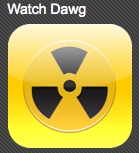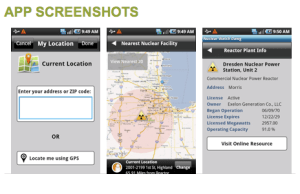 A newly released Android app, Nuclear WatchDawg, reveals where nuclear power plants and associated safety and environmental concerns are within a fifty mile radius anywhere in the U.S.
A newly released Android app, Nuclear WatchDawg, reveals where nuclear power plants and associated safety and environmental concerns are within a fifty mile radius anywhere in the U.S.
NuclearWatchDawg aggregates data from some 30 sources, mostly government and academic research labs whose research is in the public domain. Lee Guthman, who develops new apps and ventures for the GVW Group in Highland Park, Illinois noted:
“We developed this app because there is heightened interest in nuclear power following the earthquake in Japan, and damages to the Fukushima Daiichi nuclear plant there. In the U.S., people want to know what they’re living or working nearby, how big these nuclear facilities are, and what are the known issues around them, if any.”
According to a report today by Steve Herman for VOA News:
“Since the March 11 magnitude 9.0 earthquake and resulting tsunami, high radiation levels, fires and explosions at some of [Japan’s] six [effected nuclear] reactors have slowed efforts to make critical repairs to stabilize the situation.
Japanese government agencies say they are considering raising the assessment of the nuclear crisis to a level six or ‘serious accident’ on the International Nuclear and Radiological Event Scale. Currently, the Fukushima accident is rated a level five, which is considered to ‘have wider consequences.'”
Emission of radioactive vapor from one complex led to warnings about Japan’s water supply, and raised safety concerns and international scrutiny of Japanese vegetables, milk and seafood, and possibly other exports. The U.S. Food and Drug Administration announced it is blocking imports from the region in Japan where the nuclear accident occurred, for example. The crisis has forced farmers to destroy crops there, NPR reported.
[Ed’s note: TechCrunch’s Jon Evans published a story suggesting mainstream media’s coverage of the nuclear situation in Japan is tantamount to “hysteria,” but offered a guide to sites he trusted instead. It’s worth checking out the links he’s provided to independent media sources that he trusts for technically accurate perspectives.]

The Nuclear Watchdawg app is meant for those who are curious about the impacts of nuclear power near where they live and work in the U.S., or who might be buying or selling a home, or moving a business nearby. Like GVW’s other sites and apps, Nuclear Watchdawg is ad-supported (via AdMob) but free to get and use.
Guthman said his firm will likely develop other, GPS-enabled Watchdawg apps based on consumers’ major environmental and safety concerns. For the next release of Nuclear Watchdawg app (due out before the end of May) his team plans to include alert features to let users know when there is a new development, or problem at a nuclear facility in their area, and direct them as to recommended safety measures.
On a much lighter note, the firm previously developed the virtual vuvuzela app, released during the last World Cup Soccer tournament, attaining 1 million downloads within thirty days, with 29 percent of the downloads from the U.S. and 14 percent in Japan.
GVW Group in Highland Park, Illinois is a non-traditional investment group (or diversified holding company) that develops apps and websites, then spins out and funds new startups around those that have made a strong impact within a niche, or proven very popular. The company also makes clean tech and energy investments, and is a primary stakeholder of Autocar, LLC a maker of garbage trucks that run on natural gas, and iClunkIt the company behind GreenOhm.com, a site and service matching consumers to rebates and incentives for energy-efficient appliances, and home energy systems.